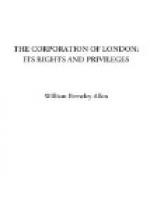Without sixteen. This, after all, is surely
the point most worthy of attention. The object
is not so much to obtain an equality of districts
as an equality of representation. It is of no
consequence that Cornhill be twice as populous as
Bassishaw, if it return twice the number of representatives,
for in that case the disparity at once ceases to exist.
Sir George Grey, however, is partial to arithmetical
equality. There must be sixteen wards and ninety-six
Common-Councilmen, or six to each ward. Not
that there is anything novel or original in this suggestion.
Sir George merely purposes to revert to the arrangements
which prevailed in the reign of Richard II.—a
period few students of history would select as an
illustration of the happiest and most constitutional
balance of power throughout all departments of the
commonwealth. No proof is adduced that this parcelment
of the City was attended with the best possible results,
to justify its restoration in the present century,
after so long an interval and such elemental changes
of the social and commercial system. It is quite
possible, and not at all unlikely, that in the time
of the second Richard ninety-six Common-Councilmen
may have been amply sufficient to discharge all the
duties that devolved upon them. But it does not
thence follow that that same number will now suffice.
If it is proposed by Sir George Grey to establish
the civic administration on the broadest, safest,
and least assailable foundation, it is scarcely consistent
to begin by narrowing that basis. It is generally
believed that it is more difficult to corrupt or influence
a large number of persons than a small one.
In the multitude of counsellors there is strength of
will, integrity of purpose, and variety of knowledge.
There is less opportunity for jobbing among two hundred
than among one hundred individuals, The smaller number
is certainly more likely to come to a mutual understanding
among themselves, and to apportion to each member
his share of the loaves and fishes. On this head
no better evidence need be adduced than the report
of the commissioners of 1855, by no means too favourably
disposed towards the Corporation. It is in the
following terms that they speak of the City, and of
the advantages incidental to a large representation:-"The
antiquity, extent, and importance of its privileges,
the long series of its charters, the large amount
of its revenues, its metropolitan position, and its
historical associations, combine to give it a character
different from that of any other municipal borough.
It may be added, that the continued predominance
of the popular element in the formation of its governing
body furnished a reason in 1835 for excepting it from
the Municipal Corporations Act; seeing that one of
the principal defects which that Act was intended
to remedy was the practical exclusion of the principle
of popular election from the government of the borough,
and the accumulation of power in the hands of a small




